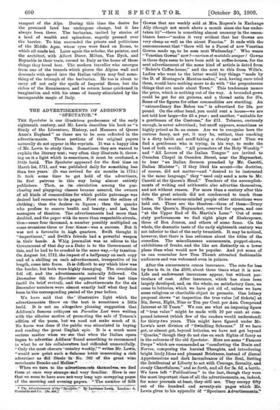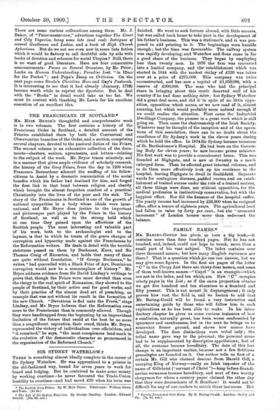THE ADVERTISEMENTS OF ADDISON'S "SPECTATOR."*
THE Spectator is our illustrious predecessor of the early eighteenth century, and Mr. Lewis describes his book as "a Study of the Literature,. History, and Manners of Queen Anne's England" as these are to be seen reflected in the advertisements. These portions of the original papers naturally do not appear in the reprints. It was a happy idea
of Mr. Lewis to study them. Sometimes they are wanted to explain the literary text; very often they illustrate it, throw- ing on it a light which is sometimes, it must be confessed, a little lurid. The Spectator • appeared for the first time on March 1st, 1711, and was published daily for something less than two years. (It was revived for six months in 1714.) It took some time to get hold of the advertisers, its first patrons in this way being almost entirely publishers. Then, as its circulation among the pur- chasing and playgoing classes became assured, the owners of all kinds of commodities for which public patronage was desired had recourse to its pages. First came the sellers of clothing ; then the dealers in liquors ; then the quacks who profess to ensure health and beauty ; and last, the managers of theatres. Theradvertisements had more than doubled, and the paper with its more than respectable circula. tion.—some four thousand, a. number possibly multiplied on some occasions three or four. 'times—was a success. But it was not a favourite in high quarters. Swift thought it impertinent," and Swift's friends had a powerful weapon in their hands. A Whig journalist was as odious to the Government of that day as a Duke is to the Government of this, and he had to be crushed in the same way,—by taxation. On August 1st, 1712, the impost of a halfpenny on each copy and of a shilling on each .advertisement, irrespective of its length, came into force. It la difficult to say which blow was the harder, but both were-highly -damaging. The circulation fell off, and the advertisements naturally followed. On December 6th the Spectator appeared for the last time (until its brief revival), and the advertisements for the six December numbers were almost exactly half what they had been in the corresponding period of the year before.
We have said that the' illustrative light which the advertisements throw on . the text is sometimes a little lurid. It is not an altogether pleasing suggestion that
Addison's famous critiques on Paradise Lost were written with the ulterior motive of promoting the sale of Tonson's edition of the poem, but: we need not make much of it. No harm was done if the public was stimulated in buying and reading the •great Engliah epic. It is a much more serious matter when we she • that when the Italian opera began to advertise Addison" found eomething to recommend in what he or his collaborators had ridiculed unmercifully. "Only the most obscure country Weekly,' " writes Mr. Lewis, "would now print such w fulsome ktter coneerning a rich advertiser as did 'Steele: 'in No. 362 of the great wine
merchants Brooke and Haler!' • When we turn to the advertisements themselves, we find them at once very strange"and very familiar. Here is one that we seem to have seen .not very long ago occupying pages of the morning and evening papers. "The number of Silk
• The Advertisiments of the " tairrenoe LewI4. London: A.
Constabto and Co. Os. net.] - : ••
Gowns that are weekly sold at Mrs. Rogers's in Exchange Ally (though not much above a month since she has under-
taken it)"—there is something almost uncanny in the resem- blance here—" makes it very evident that her Gowns are very cheap as well as the nicest Fancies." It ends with the announcement that "there will be a Parcel of new Venetian Gowns made up, to be seen next Wednesday." Who wears "Venetian Gowns" now ?—varium et inn Labile semper ! Gowns in those days seem to have been sold in coffee-houses, for the next advertisement of the same kind of article is dated from "Baker's Coffee-house," and the next to this from Wills's. Ladies who went to the latter would buy things "made by the D. of Montague's Mantua-maker," and, having once tried them, would have nothing more to do with "the preposterous things that are made about Town." This tradesman names the price, which is nothing out of the way. A brocaded gown could be got for six guineas, and a thread satin for 37s. Some of the figures for other commodities are startling. An "extraordinary fine Bohee tea" is advertised for 26e. per pound. On the other hand, you could rent a house—we are not told how large—for 25 a year ; and another, "suitable for a gentleman of the Customs," for 211. Tobacco, curiously enough, is never advertised ; but snuff appears, sometimes as highly priced as 3s. an ounce. Are we to recognise here the curious fancy, not yet, it may be, extinct, that smoking is a dirty habit and snuff-taking a cleanly one ? Then we find a gentleman who is trying, in his way, to make the best of both worlds. "All promoters of the Holy Worship" and "All Lovers of the Italian Tongue" are invited to Oxenden Chapel in ()menden Street, near the Haymarket, to hear "an Italian Sermon preached by Mr. Casotti, Italian Minister "; if they liked his accent—the doctrine, of course, did not matter—and "desired to be instructed in the same language," they "need only send a note to Mr. Casotti at the Queen's Head." Teachers of the accomplish- ments of writing and arithmetic also advertise themselves, and not without reason. For more than a century after this date the great schools did not condescend to teach these trifles. To less serious-minded people other attractions were held out. There are the theatres—three of them—Drury Lane, the Queen's, Haymarket, reserved for opera, and one "at the Upper End of St. Martin's Lane." Out of some sixty performances we find eight plays of Shakespeare, three of Ben Jonson, and others of some fame. On the whole, the dramatic taste of the early eighteenth century was not inferior to that of the early twentieth. It may be noticed, however, that there is less reticence about the titles of the comedies. The miscellaneous amusements, puppet-shows, exhibitions of freaks, and the like are distinctly on a lower plane than what would now be popular. And yet some of us can remember how Tom Thumb attracted fashionable audiences and was welcomed even in palaces.
After the amusements comes insurance. The rate for loss by fire is 68. in the 2100, about three times what it is now. Life and endowment insurances appear, but without par- ticulars of cost. After insurance, which has since been largely developed, and, on the whole, on satisfactory lines, we come to lotteries, which we have got rid of, unless we have some religious or charitable object to promote. One lottery proposal shows "at inspection the true value [of tickets] at Six, Seven, Eight, Nine or Ten per Cent. per Ann. Compound Interest at 32 Years." We can see what an imposing figure of "true value" might be made with 10 per cent, at com- pound interest (which few of the readers would understand) for thirty-two years. This might have figured under Mr. Lewis's next division of "Swindling Schemes." If we have got, or almost got, beyond lotteries, we have not got beyond "Quacks," though they do not rise on such flights of fancy as in the columns of the old Spectator. Here are some "Famous Drops" which are commended as "comforting the Brain and Nerves, composing the hurried Thoughts, and introducing bright lively Ideas and pleasant Briskness, instead of dismal Apprehensions and dark Incumbrance of the Soul, Setting the Intellectual at Liberty to act with Courage, Serenity, and steady Cheerfulness," and so forth, and all for 3s. 6d. a bottle, We have left " Publications " to the last, though they were the most important class of all the advertisements, as, indeed, for some journals at-least, they still are. They occupy fifty out of the hundred and seventy-six pages which Mr. Lewis gives to his appendix of "Specimen Advertisements?' There are some curious collocations among them. Mr. J. Baker, of " Pater-noster-row," advertises together The Court and City Vagaries, being some late (and real) Intrigues ef several Gentlemen and Ladies, and a book of High. Chureh Aphorisms. But do we not see even now in some lists fiction which it would be flattery to call doubtful side by side with books of devotion and schemes for social Utopias ? Still, there is no want of good literature. Here are four consecutive announcements: Poems on Several Occasions, by Mr. Prior ; Locke on Human Understanding ; Paradise Lost, "in 12mo' for the Pocket "; and Pope's Essay on Criticism. On the next page come Steele's Christian Hero and Gay's Pastorals. It is interesting to see that it had already (January, 1712) become worth while to reprint the Spectator. But to deal with the "Books" in detail would take us too far. We must be content with thanking Mr. Lewis for his excellent execution of an excellent idea.











































 Previous page
Previous page